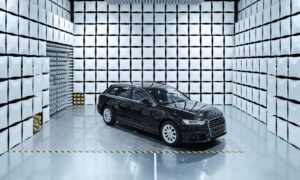
How do we all know that hi-tech automobiles, with all those electronic gadgets, operate without interference? It is all achieved by auto EMC testing—a crucial process where electronic systems operate relative to one another without the electromagnetic interference introduced by electricity or electromagnetism. With more use of electronic controls, safety technology, and infotainment systems, EMC compliance testing must be conducted to avoid failure that would compromise vehicle reliability and safety. In this blog, we’ll explore why EMC testing is critical, how it works, and the role of EMC testing labs and EMC testing equipment in compliance testing.
What is Automotive EMC Testing?
Electromagnetic Compatibility (EMC) testing is a test to confirm the electronics and electrical components of a vehicle are functioning on time in electromagnetic environments. EMC testing confirms emissions of a system and immunity for ambient interfering signals. Without compliance EMC testing, non-functioning is the job of vehicles, posing safety risks and system failure.
Why is EMC Compliance Testing Important?
Greater use of electronics in the vehicle increases the possibility of electromagnetic interference (EMI). EMC conformity testing avoids:
- Failure of safety systems such as airbags, ABS, and electronic stability control.
- Failure of infotainment, GPS, and communication modules.
- Interference to other devices or to other vehicles.
- Conformity ensures compliance with standards and the reliability of the vehicle is enhanced.
Key Automobile EMC Testing Features
1. Emission Testing
It is a measurement of electromagnetic energy that a system radiates and keeps it from affecting other devices.
2. Immunity Testing
It checks for immunity of a system to external electromagnetic interference and does not cause failure.
3. Conducted and Radiated Testing
Conducted emissions testing checks for unwanted electrical signals conducted through power lines.
Radiated emissions testing checks for electromagnetic energy radiated by an apparatus into the world.
Role of EMC Testing Equipment
For EMC compliance testing to be successful, EMC test equipment specifically intended to incorporate:
- Test environments controlled by the application of anechoic chambers.
- Spectrum analyzers to identify unwanted emissions.
- Signal generators and amplifiers to perform electromagnetic immunity interference tests.
- Equipment application renders cars safe enough to be sold.
Selecting an EMC Testing Laboratory
All these are imperative in an effort to utilize an accredited EMC test laboratory for extensive testing and conformity certification. An accredited laboratory has to provide:
- Certified EMC test services according to international standards (ISO, CISPR, FCC, etc.).
- Advanced EMC test equipment for proper diagnostic purposes.
- Engineers for interpretation of test reports and for making suggestions on how to improve.
Conclusion
As cars become increasingly electronically sophisticated, automotive EMC testing is no longer an option—it’s a safety, performance, and regulatory requirement. Accurate EMC compliance testing in an accredited EMC test lab prevents risk, improves reliability, and allows car manufacturers to deliver secure vehicles. An investment in the proper EMC testing equipment and accredited EMC testing services ensures automotive electronics comply with stringent demands. Ready to turn your car electronics into interference-free zones? Find out about EMC testing today!
